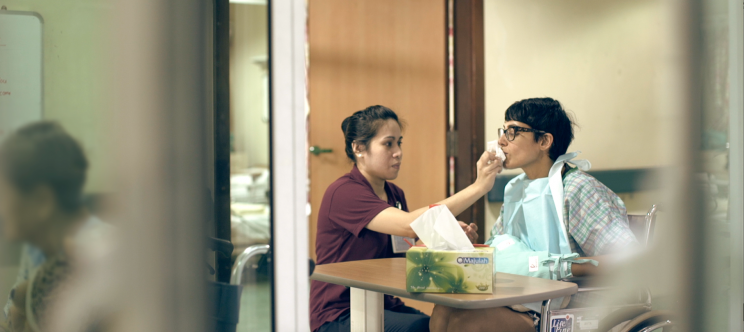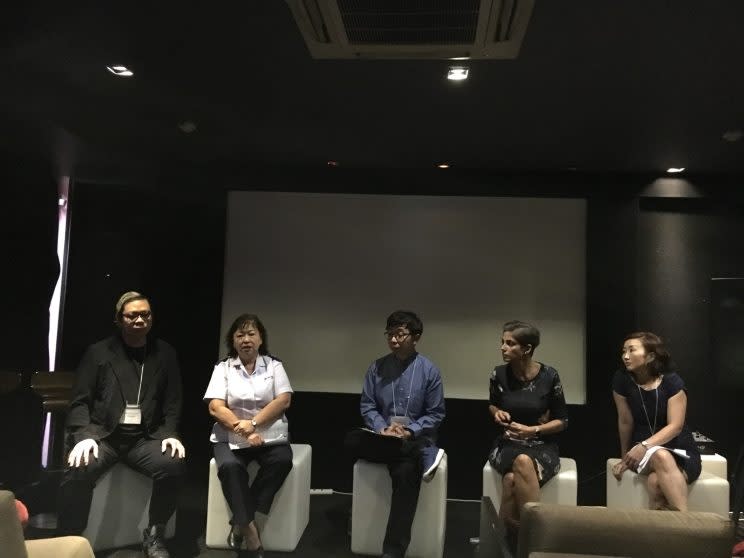TV celeb wears diapers during grim stay in Singapore nursing home

Days into her stay at The Salvation Army’s Peacehaven Nursing Home, well-known TV personality Anita Kapoor broke down, worn out by the “exhaustion, sleeplessness and dehumanisation”, as she later put it.
Speaking at a press conference on Wednesday (18 January), Kapoor said that she had not quite recovered from the “emotional and vulnerable” experience.
Kapoor is the subject of a new 70-minute documentary entitled “Anita’s Nursing Home Stay”, which follows her voluntary two-week stint as a resident at the nursing home last October. To gain realistic insights into the lives of some 400 elderly residents there, she was confined to a wheelchair and treated like a patient with mild dementia, incontinence and difficulty swallowing.
Kapoor, 45, wore adult diapers for a week and slept in a six-bed ward. She was also tied to her bed for a few nights with a body jacket, which is used to prevent falls by high-risk patients. “(The goal is) to cast light on a subject matter that has remained in the dark for far too long,” said Kapoor.
Commissioned by the Lien Foundation, the documentary aims to raise public awareness of the living conditions of some 12,000 residents in Singapore’s 70-odd nursing homes and to spark a dialogue on raising the quality of life in these homes.
The documentary is told largely from Kapoor’s perspective and includes her interactions with the residents and nurses, and input from Peacehaven. It can be viewed at www.nursinghomes.sg.
Raw and intimate, the documentary highlights complex issues such as the use of support aids like restraints to protect the patients’ safety, versus the need to preserve their dignity.
Lien Foundation CEO Lee Poh Wah, who was also at the conference, noted that most Singaporeans are not too concerned or aware of the conditions in nursing homes because “they cannot envisage themselves or their parents staying there”. This was why the Foundation commissioned the documentary, directed by Michelle Chua.
“If you want to improve service quality, I think we need to put effort on public education and awareness, so that the expectation can be raised,” said Lee, who urged Singaporeans to “put yourself in the shoes of a nursing home resident”.
The Foundation’s programme director Gabriel Lim conceded that the implementation of new solutions is hampered by manpower and financial constraints.
Consumer Charter for nursing homes

The Lien Foundation is proposing a 10-point Consumer Charter for nursing homes, which puts forth a new philosophy of care in six key areas: privacy, independence, dignity and individual preferences, accountability, transparency and personal responsibility. Among its suggestions:
Nursing home residents should live in a home-like environment where they can personalise their living areas and have privacy when they need it
Restraints, physical or otherwise, should be an absolute last resort
Residents or their families should be given a choice to be involved in the day-to-day running of the homes
Lim expressed hopes that the Consumer Charter will become an “internal compass” for nursing homes here. Members of the public are invited to give their feedback on the Charter at www.nursinghomes.sg.
A screening of the documentary was held for some officials from the Ministry of Health, who were also aware of the Charter, according to Lee.
Last July, the Lien Foundation and Khoo Chwee Neo Foundation commissioned a study by global strategy consultancy Oliver Wyman called “The Economics of Singapore Nursing Home Care”. It advocated a “Silver Hope” model for nursing homes here, which includes single- or twin-bed rooms with their own toilets, a home-like environment and a team of senior care associates and nursing aides to look after residents.



